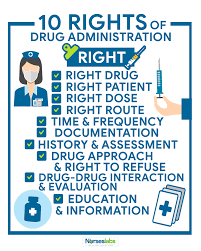A nurse administers an incorrect dose of medication to a client. The nurse recognizes the error immediately and completes an incident report. Which of the following facts related to the incident should the nurse document in the client's medical record?
Completion of the incident report
Time the medication was given
Reason for the medication error
Notification of the pharmacist
The Correct Answer is B
A is incorrect because the completion of the incident report should not be documented in the client's medical record, but in a separate file for quality improvement purposes.
B is correct because the time the medication was given is an essential fact related to the incident that should be documented in the client's medical record.
C is incorrect because the reason for the medication error should not be documented in the client's medical record, but in the incident report for analysis and prevention of future errors.
D is incorrect because the notification of the pharmacist should not be documented in the client's medical record, but in the incident report for follow-up and corrective actions.

Nursing Test Bank
Naxlex Comprehensive Predictor Exams
Related Questions
Correct Answer is A
Explanation
A. Pink, frothy sputum is a characteristic finding of pulmonary edema, which is caused by fluid accumulation in the alveoli and interstitial spaces of the lungs. This impairs gas exchange and leads to hypoxia and respiratory distress.
B. Bradycardia is not expected in pulmonary edema. The client is more likely to have tachycardia due to increased sympathetic stimulation and decreased cardiac output.
C. Flushed, dry skin is not expected in pulmonary edema. The client is more likely to have pale, cool, and clammy skin due to peripheral vasoconstriction and decreased perfusion.
D. Wheezing is not a specific finding of pulmonary edema. It may indicate bronchospasm or asthma, which are different conditions that affect the airways rather than the alveoli.
Correct Answer is D
Explanation
A. Clean the mouthpiece with warm water every 2 weeks. This is incorrect because the mouthpiece should be cleaned with warm water at least once a week, or more often if used frequently, to prevent bacterial growth and contamination.
B. Wait 10 seconds between inhalations. This is incorrect because the recommended time interval between inhalations is 1 minute, not 10 seconds, to allow adequate absorption of the medication and prevent overdose or side effects.
C. Take a quick inhalation when pressing the dispenser. This is incorrect because a quick inhalation can cause poor coordination of hand-mouth movement and result in less medication reaching the lungs. The nurse should instruct the child to take a slow, deep inhalation when pressing the dispenser, hold their breath for 10 seconds, and exhale slowly.
D. Take the medication 15 min before playing sports. This is correct because albuterol is a short-acting bronchodilator that can prevent exercise-induced bronchospasm. The nurse should teach the child to take the medication before engaging in physical activity that can trigger asthma symptoms, such as sports, cold weather, or allergens.
Whether you are a student looking to ace your exams or a practicing nurse seeking to enhance your expertise , our nursing education contents will empower you with the confidence and competence to make a difference in the lives of patients and become a respected leader in the healthcare field.
Visit Naxlex, invest in your future and unlock endless possibilities with our unparalleled nursing education contents today
Report Wrong Answer on the Current Question
Do you disagree with the answer? If yes, what is your expected answer? Explain.
Kindly be descriptive with the issue you are facing.
